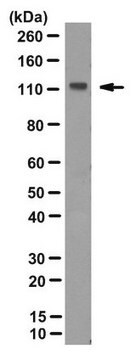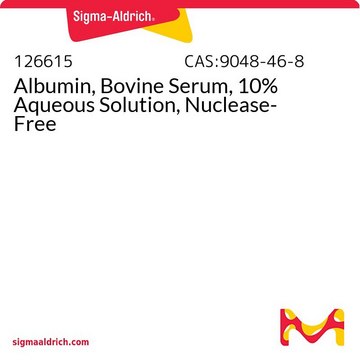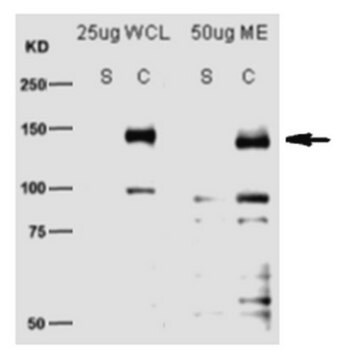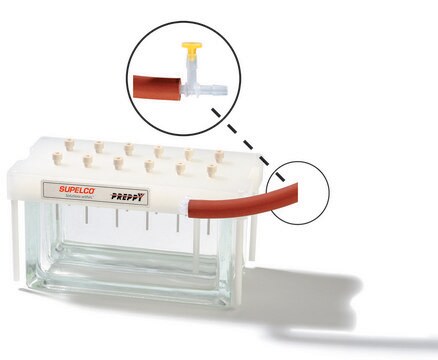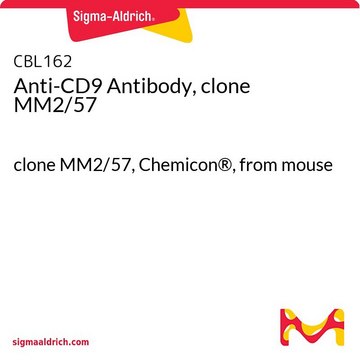推荐产品
生物源
mouse
品質等級
共軛
unconjugated
抗體表格
purified antibody
抗體產品種類
primary antibodies
無性繁殖
2G10, monoclonal
分子量
calculated mol wt 139.51 kDa
observed mol wt ~150 kDa
純化經由
using protein G
物種活性
human
物種活性(以同源性預測)
hamster
包裝
antibody small pack of 100 μL
技術
western blot: suitable
同型
IgG1κ
表位序列
N-terminal half
Protein ID登錄號
UniProt登錄號
運輸包裝
2-8°C
目標翻譯後修改
unmodified
基因資訊
hamster ... SCAP(100689048)
一般說明
Sterol regulatory element-binding protein cleavage-activating protein (UniProt P97260; also known as SCAP, SREBP cleavage-activating protein) is encoded by the SCAP gene (Gene ID 100689048) in hamster species. SCAP is a multi-pass membrane protein with five cytoplasmic domains, eight transmembrane domains, and four lumenal domains. The C-terminal domain of SCAP mediates association with SREBPs, while transmembrane helices 2 6 comprise the sterol-sensing domain that mediates sterol-induced binding of SCAP to Insigs. SCAP is mainly localized in endoplasmic reticulum and Golgi apparatus. It requires the presence of SPRING for proper localization to endoplasmic reticulum. It mediates the activation of membrane-bound transcription factors known as sterol-regulatory element binding proteins (SREBPs) for transcribing genes encoding cholesterol biosynthetic enzymes. Low sterol concentrations are reported to trigger release of Insig and lead to a conformational change in the SSD domain (aa 284-442) of SCAP, unmasking of the ER export signal and promoting recruitment into COPII-coated vesicles and transport of the SCAP-SREBP to the Golgi. In the Golgi, SREBPs are proteolytically processed releasing the transcription factor fragment of SREBPs from the membrane. At high sterol concentrations, formation of a ternary complex with Insig leads to masking of the ER export signal in SCAP, which promotes retention of the complex in the endoplasmic reticulum. (Ref.: Kober, DL., et al. (2020). Proc. Natl. Acad. Sci. USA. 117(45); 28080-28091).
特異性
Clone 2G10 is a mouse monoclonal antibody that detects Sterol regulatory element-binding protein cleavage-activating protein (SACP).
免疫原
Recombinant fragment corresponding to the first 767 amino acids of the Chinese Hamster SCAP protein combined with Ribi adjuvant.
應用
Quality Control Testing
Evaluated by Western Blotting in PC3 cell lysate.
Western Blotting Analysis: A 1:500 dilution of this antibody detected SCAP in PC3 cell lysate.
Tested Applications
Western Blotting Analysis: A representative lot detected SCAP in Western Blotting applications (Kober D.L., et al. (2020). Proc Natl Acad Sci USA. 117(45):28080-28091).
Note: Actual optimal working dilutions must be determined by end user as specimens, and experimental conditions may vary with the end user
Evaluated by Western Blotting in PC3 cell lysate.
Western Blotting Analysis: A 1:500 dilution of this antibody detected SCAP in PC3 cell lysate.
Tested Applications
Western Blotting Analysis: A representative lot detected SCAP in Western Blotting applications (Kober D.L., et al. (2020). Proc Natl Acad Sci USA. 117(45):28080-28091).
Note: Actual optimal working dilutions must be determined by end user as specimens, and experimental conditions may vary with the end user
Anti-SCAP, clone 2G10, Cat. No. MABS2288, is a mouse monoclonal antibody that SREBP cleavage-activating protein (SCAP) and is tested for use in Western Blotting.
外觀
Purified mouse monoclonal antibody IgG1 in buffer containing 0.1 M Tris-Glycine (pH 7.4), 150 mM NaCl with 0.05% sodium azide.
儲存和穩定性
Recommend storage at +2°C to +8°C. For long term storage antibodies can be kept at -20°C. Avoid repeated freeze-thaws.
其他說明
Concentration: Please refer to the Certificate of Analysis for the lot-specific concentration.
免責聲明
Unless otherwise stated in our catalog or other company documentation accompanying the product(s), our products are intended for research use only and are not to be used for any other purpose, which includes but is not limited to, unauthorized commercial uses, in vitro diagnostic uses, ex vivo or in vivo therapeutic uses or any type of consumption or application to humans or animals.
未找到合适的产品?
试试我们的产品选型工具.
儲存類別代碼
12 - Non Combustible Liquids
水污染物質分類(WGK)
WGK 1
閃點(°F)
Not applicable
閃點(°C)
Not applicable
我们的科学家团队拥有各种研究领域经验,包括生命科学、材料科学、化学合成、色谱、分析及许多其他领域.
联系技术服务部门